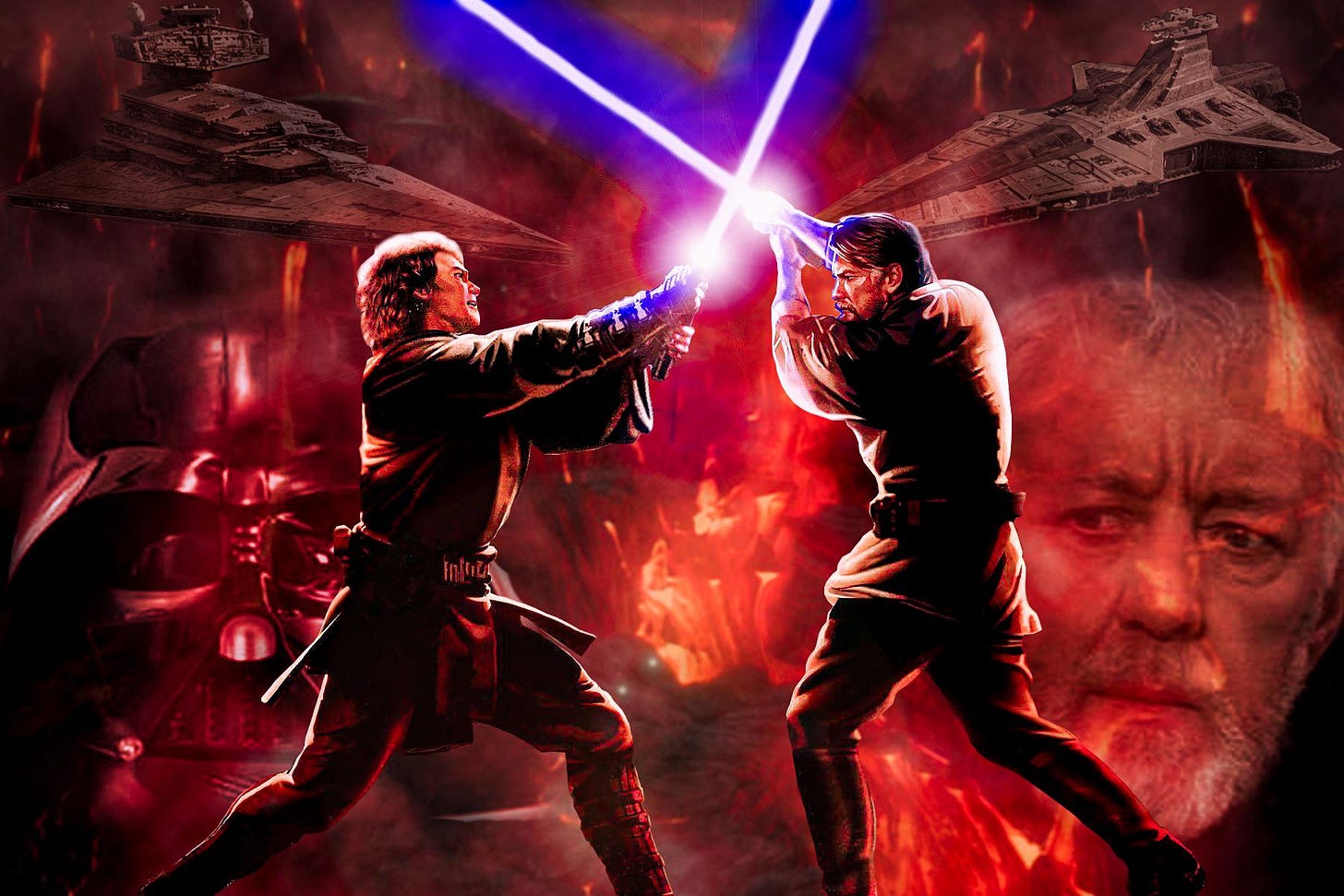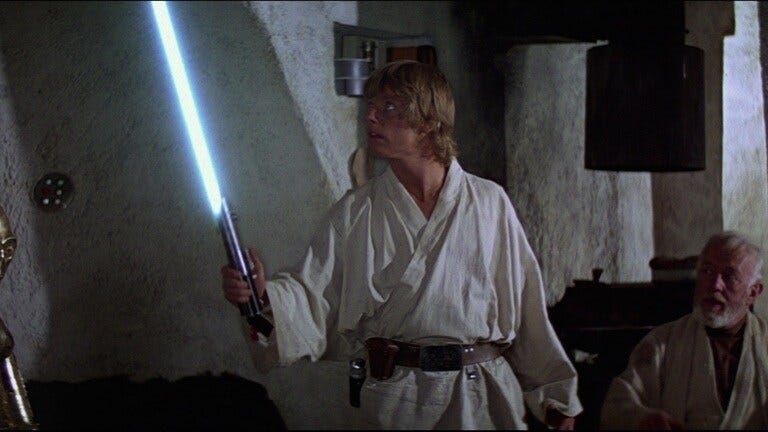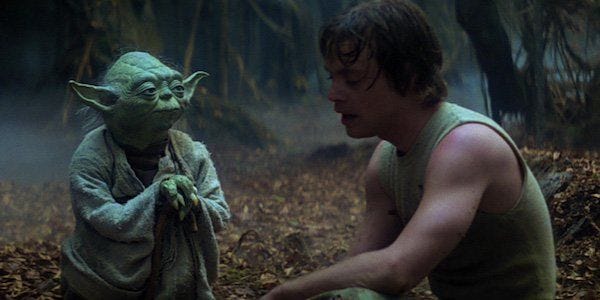The Logos in a Lightsaber: Part 1
Why Every Catholic Should Watch the "Star Wars" Trilogies

This post is a continuation of Nico Silva’s ongoing series, “The Logos in a Lightsaber” that began with his May 4th post on our site.
REASONS 1-2:
Good vs. Evil
Star Wars has always been about the struggle of light versus dark in large galactic struggles. At this point in our cultural moment, such a message might sound thematically trite. Many in our art elite would prefer we continue to tell stories without such simplistic “black and white” truths. There is no darkness or light! There are no absolutes, they tell us. However, as Catholics we should always be ready to revere quality art that evokes God’s very first act of Creation:
And God said, “Let there be light: and there was light. And God saw the light, that it was good. And God divided the light from the darkness.”
(Gen 1 : 3-4)
The Catholic artistic imagination should operate in that first division of the created world after which everything else follows: angels/fallen angels, paradise/fallen world, in the Ark/in the Flood, in the covenant/out of the covenant, in the flesh/in the spirit, heaven/hell, City of God/City of Man.
As a kid, I thought that simplicity was somewhat boring, whether it was expressed in Star Wars or in the Church, but now as an adult I appreciate the clarity of that binary in a world that seems obsessed with its tired television anti-heroes and ambiguous gray areas. Catholics should seek to watch media that doesn’t deny the reality of our divinized human capacity for goodness in Christ and trade it for a Barabbas of endless media emphasizing nothing but moral failure and voyeuristic fascination with the sins of others. If as Catholics we believe art should point our souls to do battle with evil, look no further than the Star Wars trilogies.
At its core, there is a political struggle between scrappy rebel insurgents and an evil galactic empire, an element that most people today seem to emphasize the most, likely because it resonates with our current political climate. But at the heart of the saga from the beginning is equally, if not more, a spiritual struggle. That is why the hero of the original films, Luke Skywalker, does not leave his home to fight the big bad empire like a mere political revolutionary, but through the wisdom of a warrior monk figure, Obi-wan Kenobi, who seeks to train him into becoming a “Jedi Knight” who can harness the spiritual power of the “light side” to bring about victory for the “good guys.” As Catholics who revere the biblical narrative of the Israelites winning battles to the degree that they are in touch with the God of Abraham, we should expose ourselves to art that reinforces the principle that whatever evil is occurring in this life, if we are not spiritually connected with the principle of Goodness Himself, the LORD, our struggle against the prince of this world is in vain.

2. Theology and The Role of Religion
As alluded to above, religion holds a privileged place in the narrative of the story. The heroes and the villains are both depicted as seeking to use the spiritual power of the Force to gain the upper hand in the battle but also to confront their own demons. Now, Star Wars is frequently said to be drawing from Eastern non-Christian Spirituality (such as the yin and yang concept) since the concept of the Force is spoken of in terms of a duality of the light side vs. the dark side with both requiring “balance.” While this is certainly true, the films cannot help but be a product of a Western story tradition that inevitably shapes what is originally a non-Christian spirituality into a decidedly Christian/Western one by the end of the movies. For example, in the original Star Wars film we learn that the Force is an “energy field surrounding all living things” that “binds us, penetrates us, and holds the galaxy together.” If we stop there, it would seem the main spiritual reality in Star Wars is a morally neutral entity that has no agency or affect on persons. But only scenes later, after this definition of the Force is given, the protagonist, Luke, is told by his spiritual mentor Obi-wan, that the force “partially” controls one’s actions.
So the Force has a kind of agency. Luke is also told he needs to “feel the force flowing through him” in order to access supernatural fighting abilities like anticipating where laser weapons will strike so he can deflect them with his lightsaber. This means the Force does not amplify his abilities unless he cooperates freely and surrenders to its influence. At this point, a devout Catholic might object that this is sounding like some kind of demonic possession. Do we really want to be surrendering to “forces” that control our actions? But don’t we also not have as believers a concept of grace cooperating with our free will, enabling us to access supernatural virtues through faith? While grace doesn’t control us coercively, it does influence what we desire and so in a very real way influences what we direct our actions towards.

Indeed, Star Wars depicts characters, both good and evil, who are able to access spiritual power through the force, but they must first demonstrate a kind of “faith.” For the “good” characters like Luke in The Empire Strikes Back (the second film released), he is unable to mystically cause a starship to levitate out of a wreckage in a swampy lake because he lacks faith in the Force. He’s able to make it to rise somewhat but ultimately gives up mid-way because of how difficult it is. “What you’re asking is impossible,” Luke tells his mentor, Master Yoda, who proceeds to demonstrate how to do it with ease. Even after seeing the miraculous, Luke remains incredulous: “I don’t believe it.” “That is why you fail,” Yoda sagely retorts.
The message? Spiritual ability is predicated not on natural ability or effort alone, but one's faith. In fact, throughout the franchise, non-force users frequently discover that their dismissal of the Force as “hokey religion” and “legend” is dead wrong when they see actual heroes, full of faith, emerging victorious and wielding supernatural abilities that provoke them to say, like the formerly skeptical character Han Solo in the Disney-produced sequel The Force Awakens: “It’s true. All of it.” The galaxy of Star Wars is a world of constant miracles and heroes spilling out into the world of ordinary people that feels like biblical times where prophets and priests walked the earth showing the unbelievers the power of the God of Israel through great deeds done in His Name.
Do the villains of these stories, like the infamous Darth Vader, also have a kind of “dark” faith? Indeed they do, but in Vader’s case, the movies depict him as an outlier among the evil space Nazis who think that whatever technological terrors they can devise can render obsolete that “ancient religion” based on “the power of the Force.” But Darth Vader can be seen through a Catholic lens as well, not as someone who has found spiritual power apart from God, but someone who represents those who, like the demons, satanists, and occultists of this world we live in, truly tap into demonic spiritual forces to try and make war with God, or, in Star Wars, the Good and the Light. That is why to understand the concept of the Force in a Catholic way, we must also consider that the “light side” and the “dark side” of the force can be seen as allegories for spiritual power serving the good and spiritual power derived from the Devil.
For the heroes who “use the force,” they learn throughout the films that it must be at the sacrificial service of the common good like the Jedi Knights who serve the Old Republic, vowing to protect the innocent and to never do anyone harm. In other words, the light side has an ethical moral dimension aligned with good ends. And lest Eastern influences of the Force dominate our understanding of it, we must remember that in Star Wars the heroes also speak about the Force as something that can be prayed to, as exemplified by the warrior monk Chirrut Imwe in the Star Wars anthology film Rogue One. Characters like Chirrut frequently invoke the divine qualities of the Force with phrases like: “All is as the Force Wills it,” “the Force has brought us together,” “I am one with the Force and the Force is with me.”1 In other words, the Force is something that can have a will, brings people together, and can accompany them. The Force in these moments has a kind of personal quality, which while not explored too deeply in the films themselves, can be seeds of the Gospel in the heart of a believing viewer.

But the fact that there are no other spiritual “forces” acknowledged in the movies as equally “true” spiritual realities, gives the Force a kind of monotheistic quality. There is only one true Force, which is why good people across the galaxy always seem to have on their lips that famous phrase: “May the Force be with you.” And we must try our best as Catholics not to respond: “And with your spirit.”
While not a one-to-one match-up with Christian theology (because this is sci-fi fantasy after all) there is much that Catholics can harmonize with while enjoying these films. Those who reduce the Force to elements that do bring it more in line with Hindu spirituality (like how the Force is present in all things), need to recall that these elements aren’t necessarily and in all sense just “heathen” beliefs. These doctrines do have close corollaries in Christianity such as the entirely orthodox belief that God is present to and present in all of His Creation. This is the heart of the Incarnation and Pentecost: that God wishes to “pour His spirit upon all flesh.” So what objections can we have to the idea that the Force permeates “all living things?”
“But the Force isn’t personal enough,” the objector might still say: the more it remains an impersonal being that never once speaks in the films, the more it resembles pantheism or animism. Again, I remind the Catholic Star Wars skeptic that the Force is a fictional concept and I do not seek here to map it entirely onto Christian theology. However, I will emphasize elements of the Force that should appeal to Catholics and that frankly do make the Force more Christian than pagan. Take for example, how in the prequel films (The Phantom Menace, Attack of the Clones, and Revenge of the Sith) we are introduced to the idea that the Force sends attentive believers “prophecies” such as the idea that “a Chosen One” will bring “balance to the Force.” And here’s the kicker: early on we learn that this “Chosen One” (Anakin Skywalker, the father of Luke Skywalker) even has a miraculous birth through the influence of the Force, and has no father.
If the Force can have a will, play a role in history, give supernatural abilities (graces?) to people with faith, cooperate with their free will, issue prophecies, and overshadow a woman to send a messianic figure to bring balance to the spiritual imbalance (defeat the power of darkness and death?), then I think we have long since moved beyond a merely trite Eastern yin and yang imitation.
Now, if these reasons seem compelling to you (or even if they don’t) come back next time to keep hearing more reasons to love these films!
Nico Silva is a graduate of Thomas Aquinas College in Santa Paula, CA. He is currently based in New York City and works as a 2nd Grade public school teacher in the Bronx.






Another superb entry! Pardon me for being such a Star Wars nerd, but I wanted to point out that the expression "light side" is not actually used in any of the nine movies of the saga. There are some instances that are close: Luke tells Leia that he can bring Vader back to the "good side" in Return of the Jedi; Han talks about the Force holding "the dark side and the light" in The Force Awakens; a few characters mention the "light" in The Last Jedi. You will notice, however, that the expression "dark side" is used frequently. I think this implies that the Force is intrinsically good.
Also, I don't mean to take anything away from Chirrut Imwe, but the first character to mention "the will of the Force" was Qui-Gon Jinn in The Phantom Menace. Thanks for writing this!